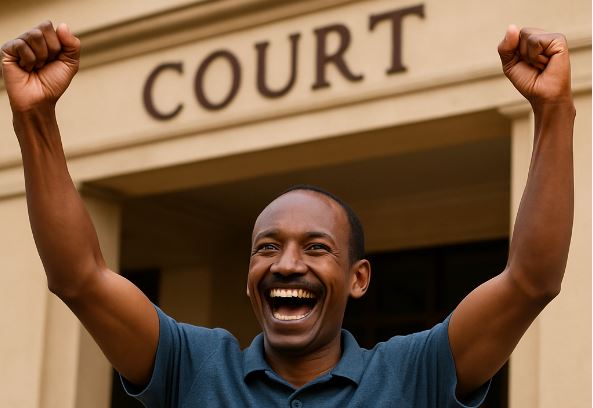
 Man celebrates after court ruled in his favour. /AI
Man celebrates after court ruled in his favour. /AI For Ibrahim Kipngetich Mutai, the journey to justice has been long and fraught with uncertainty.
Convicted of defilement and sentenced to 20 years in prison, Mutai’s fate changed when the Court of Appeal in Nakuru overturned his conviction, citing unreliable evidence and the critical role of a hostile witness.
Mutai’s ordeal began in 2017 when he was charged and later convicted of defilement on November 22 of that year by the Sotik Principal Magistrate’s Court.
His conviction premised on the Sexual Offences Act was upheld by the High Court in Bomet, but Mutai did not give up.
He took his fight to the Court of Appeal, determined to clear his name.
On February 25, 2025, Mutai appeared before Justices Mohamed Warsame, John Mativo and Mwaniki Gachoka at the Court of Appeal in Nakuru.
The State, represented by Omutelema, did not oppose the appeal.
After hearing both parties, the court delivered a decisive order.
"The court having considered the submissions by the appellant, and submissions by Omutelema for the Director of Public Prosecution, who has now conceded to the appeal, pursuant to rule 34 of the Court of Appeal rules, we hereby allow the appeal and order that the appellant be released from custody immediately, unless lawfully held."
The reasons for this judgment, delivered on May 23, 2025, reveal a story of a trial marred by unreliable testimony and legal caution.
The hearing before the trial court began on August 28, 2017, when the complainant commenced giving her evidence.
The complainant, whose evidence was central to the prosecution’s case, gave testimony that differed materially from her original police statement.
The prosecutor asked the court to step down the complainant as her evidence shifted.
Hearing resumed on September 27, 2017, and again the complainant was stepped down at the prosecutor’s request.
The court proceeded to hear evidence from the complainant’s mother and one more witness.
The complainant’s mother was categorical in her evidence that the complainant did not sleep on the same bed with the appellant.
When the complainant eventually resumed her testimony, the prosecutor applied for her to be declared hostile on grounds that her evidence varied from her witness statement.
The trial court agreed and allowed the complainant to be cross-examined by the prosecution.
She maintained that the appellant was her mother’s friend, a statement at odds with the prosecution’s case.
The prosecution called the Clinical Officer whose evidence support of the prosecution was that there was evidence of penetration.
The court noted that the value of retracted evidence depends on whether it's corroborated by other evidence or the court can conclude the evidence is inherently true based on its character and the circumstances.
“In criminal trials, retracted evidence from a key witness is considered with a high degree of caution and its value is determined by several factors. Courts generally take a skeptical view of the credibility of a witness who recants his or her previous statement, considering it a sign of unreliability.”
The judges cited Ogero Omurwa vs Republic [1979], and also referenced Daniel Odhiambo Koyo vs Republic [2011] , stating that if a witness becomes hostile or refuses to testify, the court may consider their previous statement, but its value will be assessed considering the witness's changed stance or reluctance.
"The law on such witnesses is clear. The probative value of his evidence is negligible. It may be relied upon in clear cases to support the prosecution or defence case.”
The court further explained the challenges of relying on hostile witnesses, quoting Abel Monari Nyanamba & 4 Others vs Republic [1996].
“A hostile witness is one who, from the manner in which he gives evidence, shows that he is not desirous of telling the truth to the court.”
If retracted evidence is corroborated by other evidence or the court can independently conclude its truth based on the circumstances, it may still be considered relevant.
In Mutai’s case, the only other evidence was from a clinical officer, who confirmed evidence of penetration.
However, the court found this insufficient. Section 124 of the Evidence Act was pivotal in arriving at this decision.
It states: “The accused shall not be liable to be convicted on such evidence unless it is corroborated by other material evidence in support thereof implicating him.”
In considering the above legal provision, the judges concluded: “The complainant’s evidence, is in our view unreliable. It was the evidence of the weakest kind and it could not be cured by the evidence tendered by the Clinical Officer. It follows that the conviction premised on the said evidence was totally unsafe.”
With these words, the Court of Appeal set Mutai free, ending years of legal uncertainty.
“Therefore, it is for the foregoing reasons that on February 25, 2025, we ordered that the appellant be released from prison forthwith unless otherwise lawfully held.”
For Mutai, the ruling marks the end of a painful chapter; for the justice system, it is a reminder of the importance of credible evidence, the rights of the accused, and the careful scrutiny required in criminal trials—especially when a person’s freedom is at stake.











